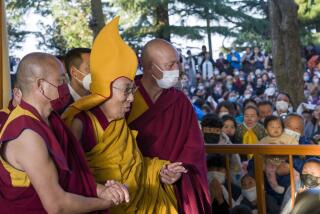Next Panchen Lama Sought : Death of an Ally Brings China New Problems in Tibet
- Share via
BEIJING — The sudden death of the Panchen Lama, the second-highest-ranking Tibetan religious leader, confronts China with a new crisis as it continues to try to defuse pro-independence sentiment in Tibet.
Even the anchorman on the national television news seemed to recognize its implications when he called the 50-year-old Panchen Lama’s death of a heart attack Saturday a “heavy loss” for China.
The late spiritual and political leader was the most effective spokesman for China’s current policy in Tibet, which stresses a limited revival of religious freedom together with emphasis that the region must remain under Chinese control.
Successor Must Be Discovered
The deceased leader’s successor, by Tibetan tradition, will be a baby boy born within the next few years who must be discovered by religious elders as his predecessor’s “reincarnation” and then sent to a monastery for training before finally being installed formally as the next Panchen Lama. Thus, for nearly two decades, until that child approaches adulthood, it will be impossible for a successor to play the same role as the late leader.
The exiled Dalai Lama, Tibet’s highest-ranking religious leader, has long espoused Tibetan independence, although he modified that stance last year by saying that he could accept Chinese control of Tibet’s foreign relations.
Over the centuries, Tibet has sometimes been independent and sometimes a part of the Chinese empire.
Supporters of the Dalai Lama, led by strongly nationalistic monks, have staged a series of pro-independence protests in the Tibetan capital of Lhasa over the past 16 months. Three of these demonstrations ended with police firing into crowds of protesters. Chinese authorities fear that further protests may break out in the weeks ahead.
Rioting Erupted Last Year
The annual Monlam festival, which begins next month, ended in anti-Chinese rioting last year. March is the 30th anniversary of the 1959 Tibetan uprising that resulted in the Dalai Lama’s fleeing to exile in India. Violence could occur in connection with either anniversary. It is rumored among foreigners in Lhasa that Tibetans have stolen a quantity of weapons from Chinese security forces and that these might be used in connection with pro-independence protests.
The late Panchen Lama was not widely adored like the Dalai Lama, but he was respected by most Tibetans as an important religious figure. After spending nearly a decade imprisoned or under house arrest during the 1966-76 Cultural Revolution, he reemerged as an advocate of both religious and economic development in Tibet. He was able to argue with some effectiveness that Tibetans should devote their energy to activity in these fields rather than a struggle for independence.
The Panchen Lama was an acceptable leader both to Beijing and the Tibetan people, a diplomat in Beijing said.
“He will be very hard to replace,” the diplomat commented. “I know of no one of comparable stature who can take his place.”
The late Panchen Lama was the 10th in a line that is believed by Tibetans to have been reincarnations of the Amitabha Buddha, or Buddha of Infinite Light.
In a dispatch from the Tibetan city of Xigaze, where the Panchen Lama died only a few days after presiding over a major religious ceremony, the official New China News Agency indicated that the tradition of discovering a reincarnated successor will be carried on.
Prayers for ‘Early Incarnation’
After reporting that top political authorities of Tibet paid their last respects Sunday to the dead leader, the news agency added that monks at the Tashilhunpo Monastery chanted prayers “praising the Panchen Lama for his outstanding achievements and wishing him an early incarnation.”
Several other official statements of praise and grief also were released Sunday.
The Panchen Lama was “a great patriot, noted statesman, devoted friend of the Chinese Communist Party and outstanding leader of Tibetan Buddhism in China,” according to an official obituary issued by the Standing Committee of the National People’s Congress and summarized by the news agency. The Panchen Lama was a vice chairman of the congress.
The State Council, China’s equivalent of a Cabinet, released a message of condolence expressing “extremely deep grief over his death.”
More to Read
Sign up for Essential California
The most important California stories and recommendations in your inbox every morning.
You may occasionally receive promotional content from the Los Angeles Times.













